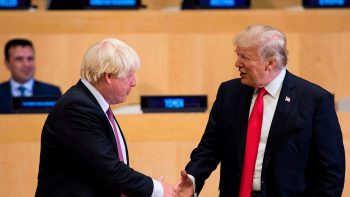Will this year’s G-20 really be effective?
TEXT OF INTERVIEW
Steve Chiotakis: Leaders will be talking about trade deficits and the Chinese currency this weekend. But will anything really get done? And why are so many countries included in this economic rodeo? Marketplace’s Stephen Beard is with us live from London to explain what it’s all about. Hi Stephen.
Stephen Beard: Hello, Steve.
Chiotakis: What actually happens in these meetings? Are people in dark corners making all these deals?
Beard: Well to some extent, yes. But there are full sessions with all the leaders sitting around and discussing a pre-arranged agenda, there are one-on-one meetings, and of course news conferences to feed the media machine at the end of it all, a declaration and a group photo of the leaders.
Chiotakis: Ah, the group photo, just this big photo opp. Is that all there is, or does anything else happen?
Beard: Well, it’s probably better that these leaders meet than that they don’t. In terms of tangible results, it’s difficult to pinpoint them. One that springs to mind, back in the 1980s, the Plaza Accord, when governments agreed to drive down the dollar to help the U.S. pull out of recession. You could argue that last year’s G-20 meeting in London brought a measure of coordination which stopped the global economy falling off a cliff. At this meeting, as we’ve heard, there’s this rift between the U.S. and Europeans over stimulus spending versus deficit-cutting. Summit watcher Sean Ricard of the Cransfield School of Management isn’t optimistic, however, that the leaders will bridge that rift in Canada:
Sean Ricard: Somehow rather, I think the incentive to work together which existed in London a year ago, when really the system was threatened with break down, has lifted, and I do not really expect any serious progress.
Critics of the G-20 say the problem is it’s too big and unwieldy, too many different points of view. Some analysts here suggest it would be better, and more effective in fact, for the U.S. to get together in a room with two others — China and Germany perhaps — a G-3. But no one’s really expecting that idea to take off.
Chiotakis: We’ll see if that makes it into the suggestion box. Marketplace’s Stephen Beard, reporting from London. Stephen, thanks.
Beard: OK, Steve.
There’s a lot happening in the world. Through it all, Marketplace is here for you.
You rely on Marketplace to break down the world’s events and tell you how it affects you in a fact-based, approachable way. We rely on your financial support to keep making that possible.
Your donation today powers the independent journalism that you rely on. For just $5/month, you can help sustain Marketplace so we can keep reporting on the things that matter to you.


















